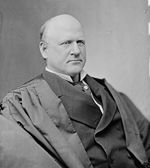No subscription or hidden extras
Read through the most famous quotes from John Marshall Harlan
The law regards man as man, and takes no account of his surroundings or of his color when his civil rights as guaranteed by the supreme law of the land are involved. ↗
#civil #civil rights #color #guaranteed #his
And so it is in prestige in achievements in education in wealth and in power. This is about the pre-World-War-I US Supreme Court justice; for his grandson the mid-20th century holder of the same position see John Marshall Harlan II. Harris (1903) a case challenging the use of grandfather clauses to restrict voting rolls and de facto exclude blacks.
He is most notable as the lone dissenter in the Civil Rights Cases (1883) and Plessy v. These dissents among others led to his nickname "the Great Dissenter. Ferguson (1896) which respectively struck down as unconstitutional federal anti-discrimination legislation and upheld Southern segregation statutes.

